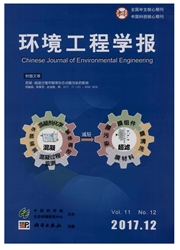

 中文摘要:
中文摘要:
为分析典型再生水处理工艺出水的回用途径适应性,采用标准指数法评价了4座不同处理工艺的再生水厂出水质量,为再生水处理工艺选择和安全回用提供参考。结果表明,4种再生水处理工艺出水用于市政杂用水时基本是安全的;除反渗透(RO)工艺外,其他工艺出水回用于景观环境用水时都存在氮磷指标超标问题;膜处理工艺的出水可以满足工业用水标准,但是常规絮凝过滤工艺出水用作工业用水应注意氮磷等指标的进一步处理;各种再生水处理工艺出水质量均不能满足地下水回灌用水标准,主要是氨氮和环境激素DBP超标问题,用作地下水回灌用水时存在一定的环境风险。
 英文摘要:
英文摘要:
The treated effluent quality of four different technologies types of reclaimed water treatment plants was evaluated with the standard index method in order to analyze the adaptability of the reuse approaches of treated effluents from typical reclaimed water treatment processes. This study could be a valuable reference to the selection of reclaimed water treatment processes and the security of reuse. The results of the study indicated that the reclaimed water treated by the four types of the treatment processes was basically safe to be used for mu- nicipal water usage. However, they all have different problems with meeting the relevant standards on certain kinds of water utilisation. The reclaimed waters treated by the treatment processes, except treated by RO process, all have problems with their nitrogen and phosphorus concentration exceeding the seandalised concentra- tion in the case of being used for landscape purpose. The effluent water treated by membrane process could meet the requirements of the standard on industrial water usage. The reclaimed water treated by conventional floccula- tion filtration process requires further treatment on nitrogen and phosphorus removal. According to the water qual- ity standard for recharging ground water, the reclaimed water treated by the four processes can not to be applied to recharge ground water because of the major concern on the over-standard of ammonia and DBP( a kind of envi- ronmental hormones) , which can cause a certain risk to the environment.
 同期刊论文项目
同期刊论文项目
 同项目期刊论文
同项目期刊论文
 期刊信息
期刊信息
